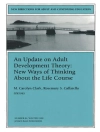Learning in informal settings is attracting growing attention from policymakers and researchers, yet there remains, at the moment, a dearth of literature on the topic. Thus this volume, which examines how science and mathematics are experienced in everyday and out-of-school-time (OST) settings, makes an important contribution to the field of the learning sciences. Conducting research on OST learning requires us to broaden and deepen our conceptions of learning as well as to better identify the unique and common qualities of different learning settings. We must also find better ways to analyze the interplay between OST and school-based learning. In this volume, scholars develop theoretical structures that are useful not only for understanding learning processes, but also for helping to create and support new opportunities for learning, whether they are in or out of school, or bridging a range of settings. The chapters in this volume include studies of everyday and ‘situated’ processes that facilitate science and mathematics learning. They also feature new theoretical and empirical frameworks for studying learning pathways that span both in- and out-of-school time and settings. Contributors also examine structured OST programs in which everyday and situated modes of learning are leveraged in support of more disciplined practices and conceptions of science and mathematics. Fortifying much of this work is a leading focus on educational equity—a desire to foster more socially supportive and intellectually engaging science and mathematics learning opportunities for youth from historically non-dominant communities. Full of compelling examples and revealing analysis, this book is a vital addition to the literature on a subject with a fast-rising profile.
Tabela de Conteúdo
Preface: Learning about Out of School Time (LOST) Learning Opportunities, Bronwyn Bevan, Reed Stevens, Philip Bell, Aria Razfar.- Part I.- Introduction: What counts as math and science?, Reed Stevens.- Chapter 1: Math I Am: What We Learn from Stories that People Tell about Math in their Lives, Indigo Esmonde1, Kristen Pilner Blair, Shelley Goldman, Lee Martin, Osvaldo Jimenez, Roy Pea.- Chapter 2: What Counts as Science in Everyday and Family Interactions?, Maureen Callanan, Megan Luce, Lara Triona, Jennifer Rigney, Deborah Siegel, Jennifer Jipson.- Chapter 3: What Counts as Mathematics when ‘We All Use Math Everyday’?: A Look at NUMB3RS, Indigo Esmonde.- Chapter 4: What Counts Too Much and Too Little as Math. Reed Stevens.- Chapter 5: When Is Mathematics, and Who Says So?, Ray Mc Dermott.- Part II.- Introduction: Understanding How and Why People Learn Across Settings as an Educational Equity Strategy, Philip Bell.- Chapter 6: Creating within and across life spaces: The role of a computer clubhouse in a child’s learning ecology, Brigid Barron, Susie Wise, Caitlin K. Martin.- Chapter 7: Discovering and Supporting Successful Learning Pathways of Youth In and Out Of School: Accounting for the Development of Everyday Expertise Across Settings, Philip Bell, Leah Bricker, Suzanne Reeve, Heather Toomey Zimmerman, Carrie Tzou.- Chapter 8: Doing Science with Others at Preschool and at Home: A Comparison of Contextually Situated Interactional Configurations and their Implications for Learning, Siri Mehus, Reed Stevens, Linda Grigholm.- Chapter 9: Shifting Languages, Spaces, and Leaner Identities: Learning Mathematics After School, Aria Razfar.- Chapter 10: Expanding Methodologies to Account For Expansive Views of Learning: A Commentary on Section II, Kris Gutiérrez.- Part III.- Introduction: STEM in the Organized Out-of-School-Time Setting, Bronwyn Bevan.- Chapter 11: Out-Of-School-Time STEM:It’s Not What You Think, Bronwyn Bevan, Vera Michalchik.- Chapter 12: Examining Youth’s Mathematics Practices in an After School Robotics Team, John Baker, Janine Remillard, Vivian Lim.- Chapter 13: After-school: An Innovative Model to Better Understand the Mathematics Learning of Latinas/Os, Lena Licón Khisty, Craig Willey.- Chapter 14: Teacher Development in After-school Mathematics Contexts: Insights from projects that capitalize on Latinas/os’ linguistic and cultural resources, Eugenia Vomvoridi-Ivanović, Maura Varley, Gabriel Viego, Ksenija Simić-Muller, Lena Licón Khisty.- Chapter 15: How ‘Hands-On’ Implicitly Informs ‘What Counts’ as Science, Rhiannon Crain, Molly Loomis, Rodney T. Ogawa.- Chapter 16: Thoughts on Science Education During the Afterschool Hours, Michael Cole.












